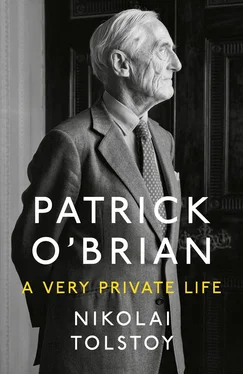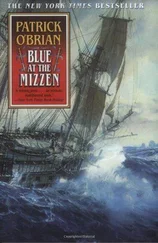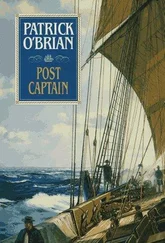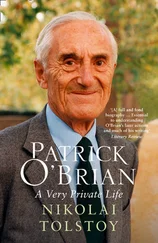Back at last in Collioure, the family appreciated what they had nearly lost. So far as their house-hunting expedition was concerned, ‘England was bad, we got too unhappy to keep up diary.’ In striking contrast, ‘Home looking perfectly beautiful & the most welcome thing I’ve known I think. Village so pleasant – everyone welcomed us.’
The Mediterranean climate helped, too: ‘For two days now it has been too warm for the Mirus [stove] even in the evenings – & in England there are tempests & snow-storms & hideous cold. We lunch daily on the beach.’
Normal routine was resumed at once, to everyone’s satisfaction. Patrick returned contentedly to his writing, and ‘R. works hard too’. At the end of the year Patrick had written to the Ministry of Labour and National Service in Penzance, requesting that Richard be permitted to postpone his national service until he had taken his GCE in June of the following year. Fortunately, this was granted.
That Christmas (1954) little presents were exchanged, but sadly the festival was marred by the underlying burden of ‘Horrid anxiety for money’. The lost luggage finally arrived, but there were hefty bills – including a couple of unexplained punctures to new tyres. As will grow more and more clear as their story unfolds, cars and my parents were not always happily matched.
Shortly after their return Patrick wrote his short story ‘The Thermometer’, which under very thin disguise depicts his unhappy childhood relationship with his father. [2] Конец ознакомительного фрагмента. Текст предоставлен ООО «ЛитРес». Прочитайте эту книгу целиком, купив полную легальную версию на ЛитРес. Безопасно оплатить книгу можно банковской картой Visa, MasterCard, Maestro, со счета мобильного телефона, с платежного терминала, в салоне МТС или Связной, через PayPal, WebMoney, Яндекс.Деньги, QIWI Кошелек, бонусными картами или другим удобным Вам способом.
On 15 January 1955 he recorded in his diary:
I finished a story – broken thermometer – 5000 [words] nearly – very heavy going. It felt dubious – a little embarrassing; self-quaintery is always to be feared in anything at all autobiographical about childhood – approving self-quaintery – own head on one side – oh so unconscious simper – poor one. M did not like it. This makes me hate her, which is monstrously unfair. Dread of losing grip.
My mother, who I do not doubt appreciated its autobiographical character, was indeed depressed on reading the story. However, Patrick now turned to a synopsis of a book for children based on Anson’s voyage around the globe from 1740 to 1744. This my mother found ‘quite beautiful and very exciting’. Three days later it was posted to his literary agent Curtis Brown, accompanied by high hopes.
On 2 February Richard’s eighteenth birthday was celebrated in style – the last they would ever enjoy together. Presents were bestowed, after which they set off for a jaunt in the car. The weather was beautifully sunny, and they ate a delicious picnic (‘stuffed olives; Tante’s pâté; camembert; cake [baked the previous evening by my mother]; meringues; lemon-curd tart’) in an olive grove beyond Banyuls. After supper at home, they went to the cinema in the square, where they watched The City under the Sea , dismissed by my mother as ‘an idiot film’, but which probably appealed to the youthful Richard as much as it did to me about the same time. [fn7] Конец ознакомительного фрагмента. Текст предоставлен ООО «ЛитРес». Прочитайте эту книгу целиком, купив полную легальную версию на ЛитРес. Безопасно оплатить книгу можно банковской картой Visa, MasterCard, Maestro, со счета мобильного телефона, с платежного терминала, в салоне МТС или Связной, через PayPal, WebMoney, Яндекс.Деньги, QIWI Кошелек, бонусными картами или другим удобным Вам способом.
Life had belatedly begun to look up. A few days earlier a local peasant named Azéma had offered to sell them 300 square metres of vineyard and garden for 125,000 francs: i.e. about £110. Hitherto this would have been well beyond their means, but the final payment for The Road to Samarcand (of which more in the next chapter) and now an advance on signing the contract for The Golden Ocean could now be imminently counted upon.
My mother enquired of a neighbour whether the price was fair, and was reassured to learn that more had recently been asked for a similar parcel of land, which in contrast lacked a water supply. Everyone was very obliging. Azéma agreed that the money could be paid in instalments, beginning in April. Meanwhile they could work the property. In the event they managed to pay the whole sum in April.
After the disastrous two months wasted in Cornish house-hunting, they now found themselves landowners! On 12 February my mother wrote triumphantly: ‘We lunched on our earth.’ Patrick had longed for this moment ever since their arrival in France. He loved the sense of security and self-worth which came with ownership of even so modest a parcel of land. Despite unfortunate consequences of his initial insistence on following the advice of his seventeenth-century guide to agriculture, his four years’ gardening in Wales had afforded him considerable experience. Finally, the ability to grow their own vegetables and fruit promised a material saving on monthly outgoings.
As ever concerned to be master of his own trade, Patrick bought for 350 francs a practical builder’s manual by Pierre Certot, Pour construire ou réparer vous-même murs et b â timents: Enseignement manuel en 12 leçons. Construction d’une pièce de cottage, de la pièce principale d’une petite maison rurale, d’une petite porcherie. Conseils divers, etc. (Paris, 1952). His battered copy is spattered with characteristically self-interrogatory notes, such as ‘* nonsense: it should be 120k – I beg his pardon; I read kilos for litres’, and ‘It is easier to pump with a wide pipe than a narrow one.’
Instructed further by friendly neighbours and assisted by Richard, with some old tools and borrowed shears they set to work pruning vines and fruit trees, and clearing the ground on the ‘aprons’ (terraces). Although their finances remained precarious, the world was becoming a better place. Advance copies of The Road to Samarcand arrived, and for just over a fortnight Patrick abandoned writing in order to assist in putting the vineyard in order, after which he established a regime of walking over from the town after breakfast to inspect their little estate, and again after lunch to take part in the labour.
Richard proved a pillar of strength, travelling with my mother to the Port-Vendres rubbish dump to collect stones for the ten terrace ramparts, shifting soil, planting vegetables, and watering. Their dog, whose seventh birthday was celebrated at this time, also felt called upon to play her part: ‘Buddug dug up the existing parsley.’
At this juncture Patrick suffered a personal blow. News came from his family that his father, who had long been failing, had died of pneumonia at his home in Ealing. While their relationship had been only intermittently happy, he was unexpectedly moved by this melancholy intimation of mortality. As my mother confided to her diary: ‘Poor P., his father died. He went aller et retour to Paris to see his [step]mother & brother [Bernard, known as ‘Bun’]. R. was very sweet to me.’ This scarcely suggests that the melancholy news was malignantly withheld from Richard, as has been conjectured by one amiable critic.
Читать дальше












